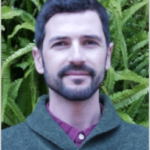2019 Latin America Division Conference Plenary Speakers

J. Miguel Kanai is an urban geographer. His work engages the urbanisation of the world under contemporary globalised capitalism. He is specifically concerned with the consequences of intensified inter-territorial competition and the various entrepreneurial strategies adopted by cities and regions in the global South as these are pressured to achieve economic upgrading and provide world-class infrastructure amidst unmet social needs and political contentiousness.
His previously published work includes multiple peer-reviewed articles in international geography and interdisciplinary journals taking stock of the consequences and motivations of culture-led regeneration schemes in Buenos Aires, Argentina as well as the rise of eco-entrepreneurialism in the Brazilian state of Amazonas and the urban and regional implications of Manaus’ rise as a city with global aspirations. He has also published collaborative work questioning urban entrepreneurial strategies in the United States and Morocco, and is currently engaged in a bibliometric project taking stock of the cosmopolitan turn in urban globalization research since the turn of the twenty-first century.
Before moving to the University of Sheffield, he taught at the University of Miami (2008-2015) and was a research officer at the London School of Economics affiliated with the Urban Age project (2005-2006). His teaching experience also includes short-term appointments in planning departments at the University of California, Irvine and the University of Southern California as well as international experience lecturing at the Federal University of Amazonas (Brazil) and Henan University (People’s Republic of China). He holds a PhD in Urban and Regional Planning from the University of California, Los Angeles (2008).
His paper “Paving (through) Amazonia: neoliberal urbanism and the reperipheralization of Roraima” (Environment and Planning A) co-authored with the late Rafael da Silva Oliveira received an Ashby Prize in 2014.

Early Career Plenary Talk: Jana Schmutzler is Assistant Professor at the Economics Department of the Universidad del Norte, Barranquilla, Colombia. She holds a PhD in economics from the Schumpeter School of Business and Economics at the Bergische Universität Wuppertal, Germany. Her research interest centers on innovation processes and entrepreneurial behaviour with a focus on developing countries. Specifically, she explores the role context plays in fostering (or hindering) these vital economic behaviours. Jana has published in internationally recognized journals in the field of Entrepreneurship and Innovation such as Entrepreneurship: Theory and Practice and Industrial and Corporate Change. In addition, she has co-edited the book “Innovation in Developing and Transition Countries”.

Closing Plenary Panel: What’s New/Urgent in Latin American Regional Studies?
Diana Ojeda is a feminist geographer interested in the study of the connections between socioecological devastation, dispossession and state formation in the Colombian Caribbean. She holds a PhD in Geography from Clark University and is Associate Professor at Instituto de Estudios Sociales y Culturales Pensar, Pontificia Universidad Javeriana. In addition to several academic articles in English and Spanish, which have been published in journals such as The Journal of Peasant Studies, Geoforum and Gender, Place and Culture, she has co-authored the book Turistas y Campesinos and the graphic novel Caminos Condenados.

Diana Gómez es antropóloga y magister en historia de la Universidad Nacional de Colombia. Es doctora en antropología de la Universidad de Carolina del Norte, Chapel Hill, Estados Unidos. Actualmente es profesora asistente del Centro de Estudios Interdisciplinarios del Desarrollo, CIDER, de la Universidad de los Andes. Sus líneas de investigación incluyen paz, justicia transicional, transformación social, desarrollo y estudios de género. Parte de su producción académica es resultado de investigaciones colaborativas. En 2016 Gómez recibió el Martin Diskin Dissertation Award de LASA y Oxfam, otorgado a académicos junior que combinan reflexión académica y activismo. Gómez ha trabajado en el sector público asesorando la construcción de políticas públicas para mujeres, personas LGBT, indígenas y afrocolombianos en Bogotá; y tiene experiencia en procesos de educación no formales, especialmente con mujeres, jóvenes y víctimas. Gómez ha publicado sobre diversos movimientos sociales, estudios de género, descolonialidad, alternativas al desarrollo, construcción de paz y justicia transicional. Colabora así mismo con periódicos de circulación nacional y medios de comunicación virtual. En 2013 recibió el reconocimiento de la Agencia Española de Cooperación Internacional para el Desarrollo, AECI, como una de las colombianas que cambian el mundo (ver: https://cfcecartagena2011.wix.com/exposicioncolombiana). Gómez ha hecho parte activa de distintos movimientos en Colombia, entre ellos el feminista y el de paz.

Sergio Montero is Associate Professor of Urban and Regional Development at the Universidad de Los Andes in Bogotá, Colombia. He is based at CIDER, an interdisciplinary research center for development studies. His interests are in the politics and governance of urban and regional planning; the local and global dynamics behind the circulation, learning and adoption of urban policy models; and local and regional economic development strategies, with an emphasis in Latin American cities and regions. Sergio has published in internationally recognized journals in urban and Latin American studies such as Environment and Planning A, Urban Studies, the International Journal of Urban and Regional Research and Latin American Perspectives. He received the Regional Studies Association/Routledge Early Career Award for his co-edited book “Fragile Governance and Local Economic Development: Theory and Evidence from Peripheral Regions in Latin America” (Routledge 2018, with Karen Chapple). Sergio holds a BA in Economics from Universidad de Granada (Spain) and a master and PhD in City and Regional Planning from the University of California, Berkeley.

Miguel Atienza Ubeda holds a Ph.D in Economics from Universidad Autónoma de Madrid (Spain) and MPhil in Development Studies at the Institute of Development Studies (IDS) at the University of Sussex (UK). He is professor of regional and urban economics at the Economics Department and Business Faculty of the Universidad Católica del Norte in Antofagasta (Chile). His main areas of research are the formation and evolution of spatial agglomerations, mining and regional development and entrepreneurship and labour interregional mobility. Currently he is the Chilean ambassador of the Regional Studies Association.

Ana Paula Vidal Bastos, who is Portuguese, did her undergraduate studies in Psychology, major in Work and Organizations (1993), after starting her career in a Regional Development Agency in the North of Portugal. She went to Japan for a Master and Doctoral degree in Economics, major in Quantitative Methods, at Tsukuba University. In 2002 she came to Brazil and after a postdoc stay in the Institute of Economics of the Federal University of Rio de Janeiro, she became a visiting and Associate Professor at the Federal University of Para in the Brazilian Amazon, from 2004-2015. It was during this long stay that she participated in the elaboration of municipal Master Plans and coordinated regional sustainable development plans as a consultant for the State Government. She has participated, occasionally, in consultancies for UNDP, NUMA, OECD and ACTO. Since 2015 she is Associate Professor at the Department of Public Policy Studies, University of Brasilia. Last year (2018) she was a visiting fellow at Department of Economic Geography at The University of Köln, Germany. Her research interests are related to regional development and socioeconomic conflicts, especially regarding traditional peoples.